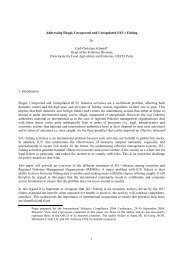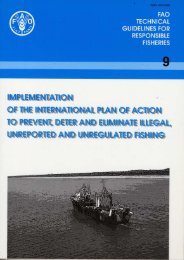Fishing Vessel Monitoring Systems: Past, Present and Future
Fishing Vessel Monitoring Systems: Past, Present and Future
Fishing Vessel Monitoring Systems: Past, Present and Future
You also want an ePaper? Increase the reach of your titles
YUMPU automatically turns print PDFs into web optimized ePapers that Google loves.
VMS: <strong>Past</strong>, <strong>Present</strong> <strong>and</strong> <strong>Future</strong> 35<br />
comply with VMS requirements. This framework usually takes one of two forms:<br />
the passage of national legislation to make compliance a matter of law, or a<br />
modification of existing fisheries regulations, so as to make compliance a<br />
condition of receiving a fishing license. Most countries, whose legal systems<br />
permit such action, prefer the latter, as the administrative procedure to modify<br />
fisheries regulations is generally simpler <strong>and</strong> faster than drafting <strong>and</strong> approving<br />
new legislation.<br />
In addition to the compliance framework, it is also of the essence that the<br />
legislation or license requirements foresee penalties for non-compliance that are<br />
commensurate with the seriousness of illegal fishing. Many coastal states levy<br />
fines measured in hundreds of thous<strong>and</strong>s of dollars, plus confiscation of catch<br />
<strong>and</strong>, often, impounding of the offending vessel.<br />
In any case, the key is to establish penalties that are effective deterrents. Failing<br />
this, the effort <strong>and</strong> expenditure necessary to implement VMS, <strong>and</strong> even MCS,<br />
would be questionable.

















